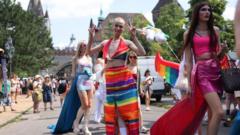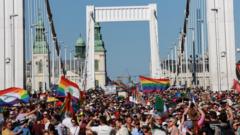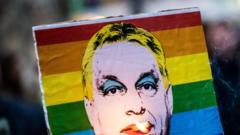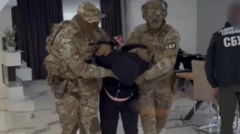In a bold move against Hungary's government, Budapest's liberal mayor announces a “Day of Freedom” event amidst a police ban on the scheduled Pride march, promising to uphold the LGBTQ community's rights.
**Budapest Mayor Defies Police Ban on Pride March, Declares 'Day of Freedom'**

**Budapest Mayor Defies Police Ban on Pride March, Declares 'Day of Freedom'**
Mayor Gergely Karacsony stands firm against police efforts to cancel the annual Pride march, asserting a commitment to LGBTQ rights.
The tension in Hungary continues to escalate as the authorities ban Budapest’s annual Pride march, but Mayor Gergely Karacsony maintains that the event, now termed a "Day of Freedom," will proceed as planned on June 28. The police's decision follows Prime Minister Viktor Orban’s government, which has actively challenged the rights of the LGBTQ community and invoked new laws that restrict assemblies considered in violation of child protection standards related to public promotion of homosexuality.
Karacsony’s declaration reflects a civic defense against what he describes as an infringement on rights. “The police have no jurisdiction to prevent this Day of Freedom,” he wrote on social media, while emphasizing that the event is not categorized under the rules governing freedom of assembly. Expected to attract tens of thousands from both Hungary and abroad, the mayor humorously remarked that the police's actions could be equated to attempting to ban a "procession of unicorns."
The backdrop of the ban stems from recent legislative moves by Orban’s Fidesz party, including a significant law passed in March that could impose hefty fines on participants identified via facial recognition during gatherings. Fidesz communications chief Tamas Menczer responded by stating that the party prioritizes child protection over other freedoms, dismissing Pride as unsuitable for public display.
Prior to the police’s ban, event organizers, such as the Rainbow Mission foundation, put forth an array of activities on the same date, calling for solidarity with the Pride movement while evading direct confrontation with the authorities. The city’s Supreme Court has, thus far, opposed police efforts to quash these events, providing some legal backing for the promoters of Pride.
On June 16, in a show of united support, Karacsony and Budapest Pride spokesperson Mate Hegedus recorded a joint video to share their plans for the "Day of Freedom," distinguished from a typical Pride march. They reassured participants that festivities will not embody conventional Pride elements like trucks or dancers, focusing instead on a broader message of freedom for all citizens.
In light of police concerns about underage exposure to the procession, police chief Tamas Terdik justified the ban in an official document, yet critics argue that the law should not be a tool for suppressing civil rights. Observers and human rights organizations, including the Hungarian Helsinki Committee, are encouraging participants to stand firm in the face of potential fines, asserting that a large turnout could deter police enforcement by creating logistical challenges for authorities.
As the date approaches, the unfolding events highlight a significant clash between state power and civil liberties in Hungary, drawing attention both nationally and internationally.
Karacsony’s declaration reflects a civic defense against what he describes as an infringement on rights. “The police have no jurisdiction to prevent this Day of Freedom,” he wrote on social media, while emphasizing that the event is not categorized under the rules governing freedom of assembly. Expected to attract tens of thousands from both Hungary and abroad, the mayor humorously remarked that the police's actions could be equated to attempting to ban a "procession of unicorns."
The backdrop of the ban stems from recent legislative moves by Orban’s Fidesz party, including a significant law passed in March that could impose hefty fines on participants identified via facial recognition during gatherings. Fidesz communications chief Tamas Menczer responded by stating that the party prioritizes child protection over other freedoms, dismissing Pride as unsuitable for public display.
Prior to the police’s ban, event organizers, such as the Rainbow Mission foundation, put forth an array of activities on the same date, calling for solidarity with the Pride movement while evading direct confrontation with the authorities. The city’s Supreme Court has, thus far, opposed police efforts to quash these events, providing some legal backing for the promoters of Pride.
On June 16, in a show of united support, Karacsony and Budapest Pride spokesperson Mate Hegedus recorded a joint video to share their plans for the "Day of Freedom," distinguished from a typical Pride march. They reassured participants that festivities will not embody conventional Pride elements like trucks or dancers, focusing instead on a broader message of freedom for all citizens.
In light of police concerns about underage exposure to the procession, police chief Tamas Terdik justified the ban in an official document, yet critics argue that the law should not be a tool for suppressing civil rights. Observers and human rights organizations, including the Hungarian Helsinki Committee, are encouraging participants to stand firm in the face of potential fines, asserting that a large turnout could deter police enforcement by creating logistical challenges for authorities.
As the date approaches, the unfolding events highlight a significant clash between state power and civil liberties in Hungary, drawing attention both nationally and internationally.


















